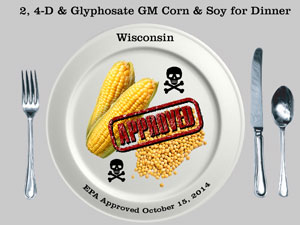The global GMO-herbicide market, analysts predict, expects massive earnings within the next decade by increasing spray yields. Accompanying 2, 4-D, a ghost from Vietnam, in the crop fields are and will continue to be Glyphosate, a highly lucrative poison. With earnings expected to exceed 8.50 billion by 2020, according to the Digital Journal, the GM market and its demand for the poison will likely only escalate in upcoming years.
Over 700-kilo tons of Glyphosate was sprayed in 2013 alone, a figure only continuing to grow as its targets become more and more resistant to its effects. A new Grand View Research Inc. study projects exponential financial growth of the herbicide industry, directly correlated with GM products. It is, in fact, the GM industry which drives the global demand for these toxins, the bulk of which have been proven harmful to humans, wildlife, and the environment.
In response to growing global demand for Glyphosate and 2, 4-D, the Center For Biological Diversity issued an October 2014 press release. “Ignoring its legal duty to identify risks to endangered species”, it read, “the Environmental Protection Agency today approved a new pesticide product-enlist duo- a novel combination of two of the most commonly used pesticides in the nation, 2, 4-D and Glyphosate.” Despite evidence that 20 endangered species may be exposed by increased spraying the agency failed to consult the US fish and wildlife service on its decision or possible other likely effects. “This was an unbelievably foolish decision,” says Brett Hartl, endangered species policy director at the center, “enlist duo will harm dozens of endangered species and is another nail in the coffin for the monarch butterfly.”
Hartl’s outfit reports more than 30 million pounds of toxin is spraying in the US yearly, and an end in absolutely nowhere in sight. Large corporate, more concerned with net profits, persistently lobby against even the most basic spraying regulations, despite proven hazards to human and environmental wellbeing. “Once again the EPA has turned a blind eye to the endangered species, clean water, and human health in its apparently endless desire to placate multinational pesticide companies. At a minimum, the agency needs to restrict the use of this new chemical cocktail around streams, endangered species habitats, and our communities.”
-I’m just saying
By Isiah Holmes






